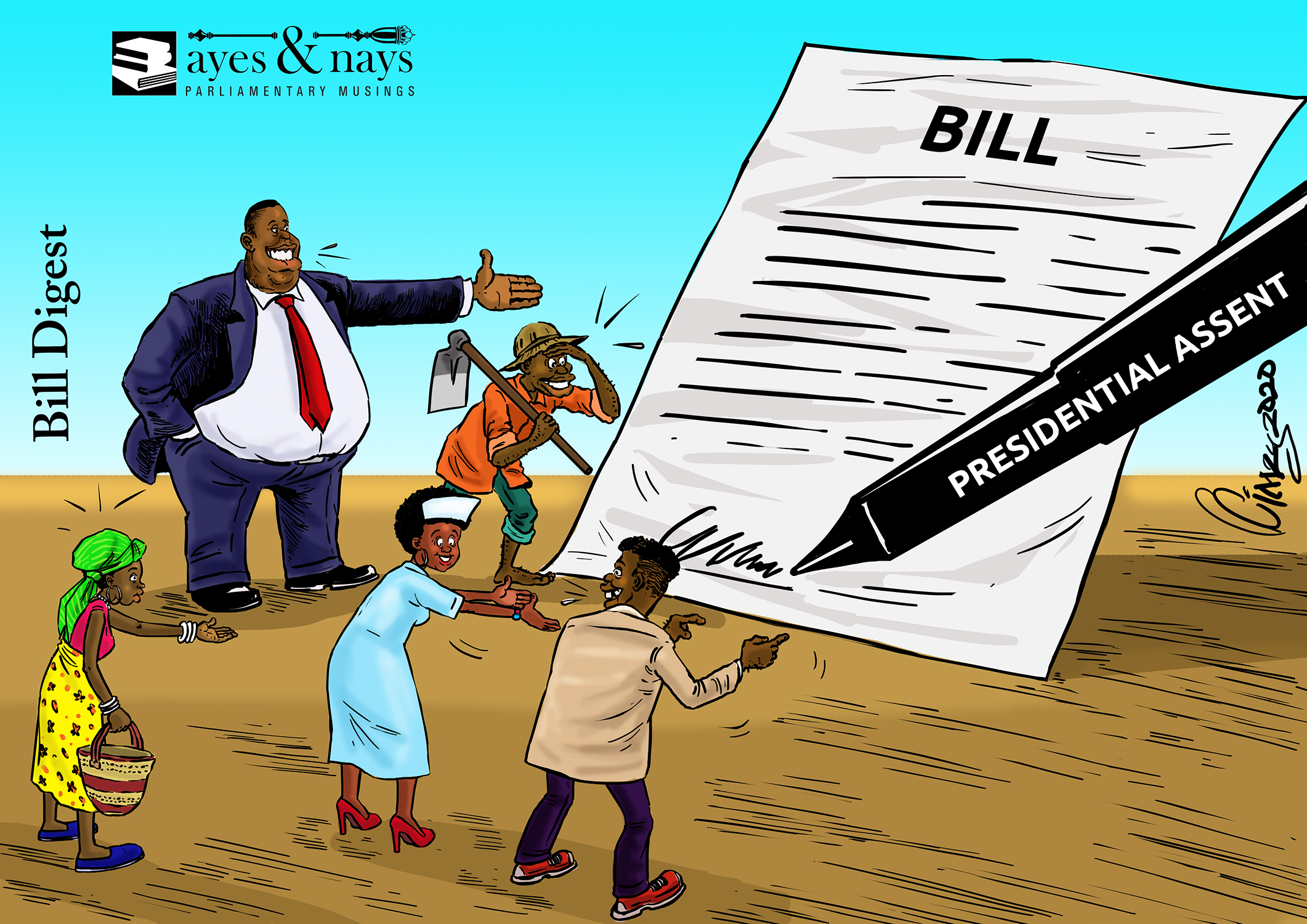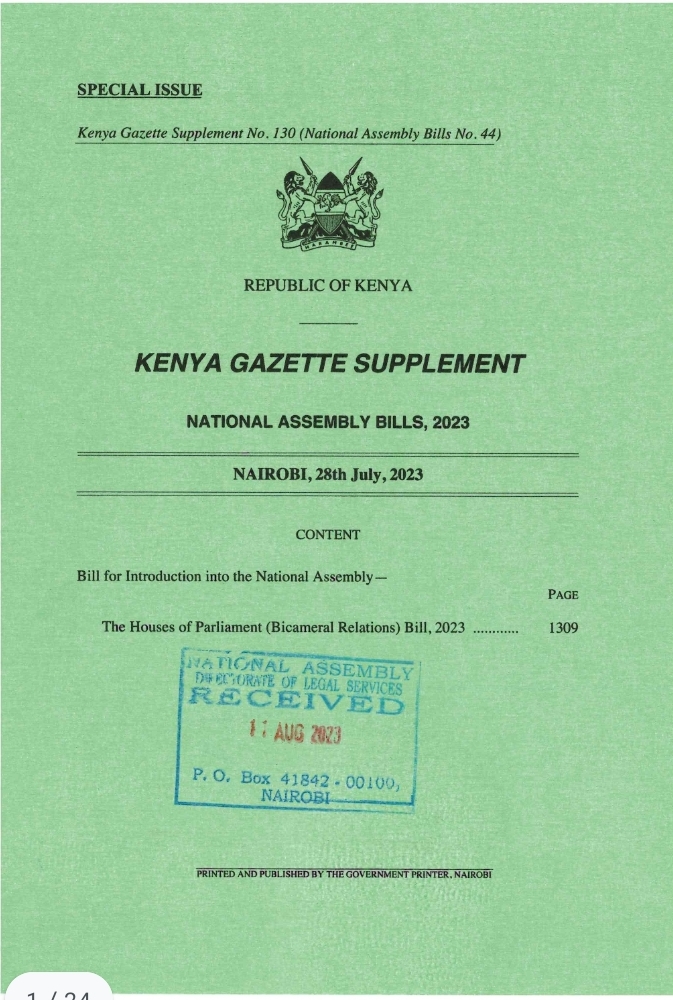
About the Bill
The Houses of Parliament (Bicameral Relations) Bill, 2023 (National Assembly Bills No. 44 of 2023) is a Bill sponsored by Hon. Samuel Chepkonga, Member for Ainabkoi Constituency. It was published on 28th July, 2023 and read for a first time on 17th August, 2023. Thereafter, it was committed to the Departmental Committee on Justice and Legal Affairs.
The principal object of the Bill is to give effect to Articles 109, 110, 113, 114 and 118 of the Constitution. The Bill also seeks to foster the bicameral relations by prescribing procedures for ensuring seamless consideration of the legislative business of both Houses.
Highlights of the Bill

The Bill contains 5 Parts. It has 20 clauses. Part I of the Bill outlines the preliminary provisions. Part II of the Bill provides for publication of Bills and Acts of Parliament and the words to be used for the enacting formula. Part III of the Bill provides for the joint resolution of a question under Article 110(3) of the Constitution. Part IV of the Bill provides for the conduct of joint proceedings and committees. Part V of the Bill provides for miscellaneous provisions.
Clause 1 of the Bill is the short title.
Clause 2 of the Bill provides for the interpretation of terms as used in the Bill.
Clause 3 of the Bill provides for the objects of the Bill which include to provide a framework for determining the nature of a Bill; define the Bills that do not require a joint resolution by the Speakers under Article 110(3) of the Constitution; define the Bills that are considered only by the National Assembly; define Bills that are Bills not concerning county governments and define Bills concerning county governments.
Clause 4 of the Bill provides for the publication of Bills originating from either House of Parliament. Clause 4(2) of the Bill provides as follows:
(2) Where a request is submitted to the Government printer by the respective Clerk for the publication of a Bill under subsection (1), the Government Printer shall cause to be published in the Gazette the Bill within a period not exceeding seven days after the date of receipt of the request.
The timeline is to cure scenarios where the Government printer at times delays in the printing of Bill requests.
Clause 5 of the Bill provides for the publication of Acts of Parliament after assent by the President and the enacting formula.
Clause 6 of the Bill provides for the manner in which the question arises for purposes of Article 110(3) of the Constitution and the matter in which one Speaker notifies the other of the question arising. Clause 6(5) of the Bill provides for parameters that a Speaker will use in determining whether a question has arisen under Article 110(3) of the Constitution. It provides as follows:
(5) In determining whether a question has arisen under Article 110 (3) of the Constitution, a Speaker shall for the purposes of subsection (2)—
(a) consider the Bill’s true purpose, intent and legal effect;
(b) examine the contents of the Bill and the memorandum of objects and reasons to ascertain its inherent nature; and
(c) consider whether the Bill falls under the exclusive mandate of the National Assembly pursuant to Article 109(3) of the Constitution;
(d) consider whether the provisions of the Bill specifically affect the functions and powers of county governments set out in the Fourth Schedule to the Constitution.
Clause 7 of the Bill outlines the instances where no question can be deemed to arise under Article 110(3). It provides as follows:
7. The provisions of section 6 shall not apply to—
(a) a Bill to amend the Constitution as provided for under Article 255, 256 and 257 which is considered by both Houses;
(b) a Bill relating to the election of members of a county assembly or a county executive under Article 110(1)(b) of the Constitution which is considered by both Houses;
(c) the annual County Allocation of Revenue Bill as provided for under Article 218 of the Constitution which is considered by both Houses;
(d) an Appropriation Bill as provided for under Articles 95(4) (b), 221, 222, and 223 of the Constitution which is considered only by the National Assembly;
(e) a Finance Bill introduced pursuant to Articles 95(4)(c), 114, 209(1), 210 and 221(1) of the Constitution which is considered only by the National Assembly;
(f) any Bill providing for taxation and other revenue-raising powers of the national government introduced pursuant to the provisions of Part 3 of Chapter Twelve of the Constitution which is considered only by the National Assembly; and
(g) a Bill not concerning county governments which pursuant Article 109(3) of the Constitution is considered only in the National Assembly and passed in accordance with Article 122 and the Standing Orders of the Assembly.
Clause 8 of the Bill provides for consideration of a question arising and the options available to the Speaker upon such consideration. It provides that upon receipt of a notification of a question, the Speaker of the second House shall within a period not exceeding seven days, consider the question raised. Upon consideration of the question, the Speaker may agree or disagree with the question as raised.
Clause 9 of the Bill provides for agreement over the question raised in which case a Certificate of joint Resolution is issued. It provides that whenever a Speaker of the second House agrees with the question raised, the Speaker shall prepare and transmit a Certificate of Joint Resolution in duplicate, for endorsement by the Speaker of the originating House. Upon receipt of a Certificate of Joint Resolution on a question as to whether a Bill concerns counties, the Speaker of the originating House shall, as soon as is practicable indicate their resolution and convey a copy of the Certificate to the Speaker of the second House. The Certificate of Joint Resolution shall be in the form set out in the Second Schedule and shall be deemed to be evidence of the resolution of the particular question.
Clause 10 of the Bill provides for disagreement over the question raised and the options available to the Speaker upon such disagreement. It provides that whenever the Speaker of the second House disagrees with the question raised, the Speaker shall immediately refer back the question to the Speaker of the originating House for reconsideration noting the specific clauses of the Bill subject to the disagreement and the specific reasons for the disagreement.
If the Speaker of the second House refers a question back to the Speaker of the originating House Speaker for reconsideration, the Speaker of the originating House may, following the appropriate procedures as set out under the respective Standing Orders—
(a) cause the Bill to be modified taking into account the observations and recommendations of the Speaker of the second House; or
(b) further disagree with the observations and recommendations of the Speaker of the second House on the question.
If the originating Speaker causes the Bill to be modified to accommodate the observations and recommendations of the Speaker of the second House, the question shall be deemed to have been resolved for purposes of Article 110(3) of the Constitution.
The Speaker of the originating House shall notify the House on the modification of the Bill and the procedure for its consideration as modified.
Where the Speaker of the originating House further disagrees with the observations and recommendations of the Speaker of the second House on the question, the provisions of section 11 (on conciliation in the event of disagreement) shall apply.
Clause 11 of the Bill provides for conciliation in the event of disagreement. It provides that where the Speakers are unable to jointly resolve a question arising under Article 110 of the Constitution, the Speakers may—
(a) refer the Bill to its sponsor for further directions;
(b) jointly appoint any person or body of persons to make such recommendations within seven days on the way forward as may be appropriate.
Where the Speakers of the Houses of Parliament are unable to reach a joint resolution on a question after invoking the provisions above, the originating House may proceed with the consideration of the Bill notwithstanding the disagreement.
Clause 12 of the Bill provides for consideration of money Bills especially where such a finding is arrived at under Article 114(2) in respect of Bills emanating from the Senate.
Clause 13 of the Bill provides for co-sponsorship of Bills.
Clause 14 of the Bill provides for Mediation Committees and includes provisions on the chairing, voting and conduct of such committees
Clause 15 of the Bill provides for Joint committees and their procedures.
Clause 16 of the Bill provides for Joint sittings of the Houses and the enforcement of the Standing Orders of the House presiding over such sittings.
Clause 17 of the Bill provides for an Address of Parliament by visiting dignitaries.
Clause 18 of the Bill provides for address of Parliament by visiting dignitaries.
Clause 19 of the Bill provides for public participation processes.
Clause 20 of the Bill provides for use of alternative dispute resolution mechanisms to resolve disputes in keeping with the judicial principles outlined under Article 159(2)(c) of the Constitution. The clause further provides that where a dispute arises between the Houses relating to the discharge of their respective functions, the Houses shall use alternative forms of dispute resolution in seeking to resolve the dispute and shall before seeking redress in court on any dispute relating to the discharge of their respective functions, first exhaust the alternative dispute resolution mechanisms.
The First Schedule provides for the notification of question arising under Article 110(3) of the Constitution.
The Second Schedule provides for the Certificate of Joint Resolution.
How do you submit your views?
The Bill has been committed to the Departmental Committee on Justice and Legal Affairs which is considering it and will table its report. Pursuant to standing order 127(3) of the National Assembly Standing Orders, the Committee shall facilitate public participation and shall take into account the views and recommendations of the public when the committee considers the Bill.
In addition, pursuant to standing order 127(4) of the National Assembly Standing Orders, the Committee is required to submit its report to the House within thirty calendar days of the committal of the Bill to the Committee.
Members of the public may submit any comments on the Bill to the Office of the Clerk of the National Assembly, 1st Floor, Main Parliament Buildings, Nairobi, Kenya, through P.O. Box 41842-00100, Nairobi, Kenya or email cna@parliament.go.ke.
Listen to this post:
_
ayes & nays
